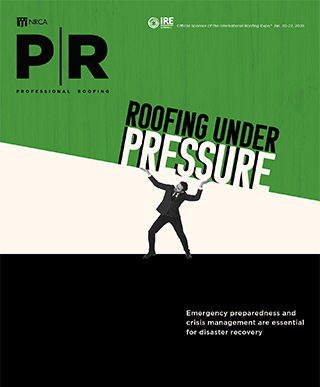Recent legislative action regarding electronic logging data for commercial truck drivers is causing the trucking industry concern as the new rule is scheduled to take effect Dec. 18. The regulation could affect NRCA members by causing delays with roofing materials deliveries.
Background
In 2012, the Moving Ahead for Progress in the 21st Century Act was signed into law. The act primarily outlined highway funding, but one provision called for the secretary of transportation to prescribe regulations requiring the trucking industry to use electronic logging devices (ELDs) to record commercial driving hours of service. The intent was to promote a safer work environment for drivers and improve commercial motor vehicle safety by updating the record-keeping process from the outdated paper method.
The regulation also would help improve drivers' compliance with current hours-of-service regulations. As of July 2013, the number of hours a driver can complete weekly was decreased from 82 to 70 hours.
In December 2015, the Federal Motor Carrier Safety Administration (FMCSA) published the electronic logging data final rule mandating the use of ELDs by all professional truck drivers and commercial motor carriers who are required to keep hours-of-service logs of their Driver's Record of Duty Status. The final rule will apply to about 3 million drivers.
By helping reduce driver fatigue and enabling ongoing tracking and enforcement of drivers' hours of service, using ELDs is expected to save 26 lives and prevent 562 injuries annually, according to FMCSA. An ELD synchronizes with a vehicle's engine to track driving time accurately, is tamper-proof and allows access to the data by law enforcement officials.
According to FMCSA, implementation is expected to save the trucking industry more than $1 billion annually as a result of reduced paperwork, reduced fuel wastage achieved by tracking truck idling time, and an ability to alert drivers of upcoming hours-of-service violations and vehicle diagnostics. However, the cost for an ELD is estimated between $165 and $832 per commercial truck annually, costing the trucking industry more than $1.5 billion.
Legislative action
On July 17, the House Committee on Appropriations included language in the Transportation, Housing and Urban Development appropriations bill that calls for the secretary of transportation to "analyze whether a full or targeted delay in ELD implementation and enforcement is appropriate." It is worth noting companion legislation from the Senate Committee on Appropriations issued July 27 doesn't include this language, calling into question whether such language will survive the remainder of the appropriations process.
In its report regarding the bill, the House Committee on Appropriations expressed concern with the "heavy burden of this mandate, especially on small carriers" and explained a delay is needed to address implementation challenges, which include significant technological concerns. For example, the devices must be certified, but certification is left to the device's manufacturer without clear guidelines. Other concerns include cyber vulnerability, law enforcement's ability to access the data and connectivity in remote areas.
On July 18, Rep. Brian Babin (R-Texas), a member of the Committee on Transportation and Infrastructure, introduced the ELD Extension Act of 2017 (H.R. 3282) to delay the implementation date from December 2017 to December 2019. Babin argued ELD technology shouldn't be forced on small businesses and explained the legislation would offer temporary relief for those businesses that don't want the burden or expense. At press time, the ELD Extension Act of 2017 had 38 co-sponsors.
Mixed industry reaction
The electronic logging data final rule has elicited mixed reactions in the trucking and manufacturing industries. The Owner-Operator Independent Drivers Association (OOIDA), which represents small-business trucking professionals, opposes the final rule and claims it violates drivers' Fourth Amendment rights against unreasonable searches and seizures.
In April, OOIDA petitioned the U.S. Supreme Court to hear its case after the U.S. Court of Appeals for the Seventh Circuit ruled against OOIDA in a case challenging the final rule's legality. The U.S. Supreme Court declined to hear the case, leaving in place the lower court's ruling to uphold the final rule.
Conversely, the American Trucking Association strongly supports implementing the final rule by its current deadline, arguing it will improve regulatory compliance and save lives. The association recently sent a letter to the chairmen and ranking members of the House and Senate appropriations committees urging them to keep the Dec. 18 deadline. The Alliance for Driver Safety & Security (also known as the Trucking Alliance) echoes those sentiments, deeming it critical for the industry to maintain the public's trust.
Be prepared
Capitol Hill sources indicate it will be an uphill battle to procure any delays to the final rule, especially because other legislative priorities, such as budget and tax reform, require attention.
Once enacted, implementing the final rule has the potential to delay and disrupt job-site deliveries. Contractors may want to contact manufacturers, distributors and other roofing suppliers to identify any potential disruptions before the rule takes effect. To the extent possible, it is imperative contractors strive to adhere to scheduled shipping dates and times to avoid change and cancellation fees. In addition, there should be plenty of time allowed for unloading and loading so subsequent trucks can avoid wait times. Whenever possible, trucks should unload at a staging area to reduce time. Carriers also may ask about overnight parking options nearby or on-site so drivers do not exceed the maximum hours of service allowed.
NRCA will continue to monitor this issue and keep members updated. However, barring any complete action by Congress and President Trump, roofing contractors should be prepared for the electronic logging data final rule to take effect in December.
Teri Dorn is NRCA's director of federal affairs.



